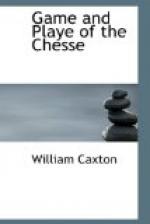It will be seen that this is the foundation of Caxton’s dedication of the Chess-book to the Earl of Warwick. The “Golden Legend,” printed by Caxton in 1484, was in effect a translation from “La Legende Doree,” made before the year 1380 by Jehan de Vignay, who in his prologue mentions that he had previously translated into French “Le miroir des hystoires du monde,” at the request of “Ma dame Jehanne de Borgoigne, royne de France."[15] This preface Caxton, as usual, adopted with some changes of name and other alterations, amongst which is a reference to “the book of the chesse” as one of his works. The “Legenda Aurea” of Jacobus de Voragine is, of course, the original source of De Vignay’s “Legende Doree,” and Caxton’s “Golden Legend.”
Ferron and de Vignay were avowedly translators. Their original was Jacques de Cessoles. The name of this author has been tortured into so many fantastic forms that one may almost despair of recovering the original. Caesolis, Cassalis, Castulis, Casulis, Cesolis, Cessole, Cessulis, Cesulis, Cezoli, de Cezolis, de Cossoles, de Courcelles, Sesselis, Tessalis, Tessellis, de Thessolus, de Thessolonia, and de Thessolonica are different manners of spelling his surname, and the two last are certainly masterpieces of transformation. Prosper Marchand has amused himself by collecting some vain speculations of previous writers as to the age, country, and personality of Jacques de Cessoles. Some counted him a Lombard, some an Italian, whilst others again boldly asserted that he was a Greek!
He lived towards the end of the thirteenth or beginning of the fourteenth century, and having joined the Dominican order, was a “Maitre en Theologie” of that brotherhood at Reims. Various works are attributed to him, and his learning and piety had many eulogists.
It is more than probable that his name would have been much less widely known but for the happy accident that turned his attention to the game of chess. It was a popular diversion, and in the moralizing spirit of the age he saw in it an allegory of the various components of the commonwealth. The men who were merely killing time were perhaps flattered at the thought that they were at the same time learning the modes of statecraft. Then, as now, the teachers of morality felt that a song might reach him who a sermon flies, and they did not scruple to use in the pulpit whatever aids came handy. The popular stories, wise saws, and modern instances, were common enough on the lips of the preachers, and such collections as the “Gesta Romanorum show what a pitch of ingenuity in unnatural interpretation they had reached. An appropriate instance is furnished by it in the following quaint fashion of moralizing the chess play:—




